Affiliate disclosure: This post may contain affiliate links. Please see our Privacy Policy.
It was our first summer living off the grid, and of course, we had to get chickens. Our established flock of ducks moved with us from our previous home, but we were starting fresh with baby chicks.
We did what we’d always done…bought spring chicks and set them up in a Rubbermaid tote with a heat lamp. A heat lamp pulls a lot of electricity, and it only took a few hours for that heat lamp to completely drain our batteries.
Clearly raising chickens off the grid is a bit more complicated than a standard operation. It was time to re-learn how to raise chickens without electricity like our ancestors had for most of history.
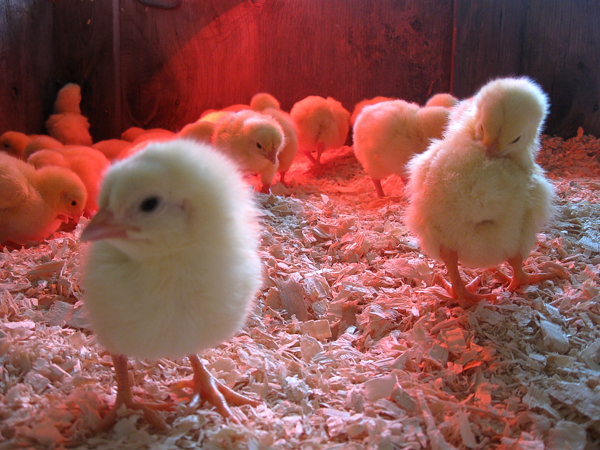
Brooding Chicks without Electricity
Once you have an established flock, the mother hens can do the brooding. Choose a breed known for being good mothers. Heritage dual-purpose breeds are an ideal choice since dual-purpose chicken breeds tend to have large bodies that will do better in cold winters without a heat lamp.
Historically, you’d better believe that any chicken raised was going to be dual-purpose. Once a chicken was done producing eggs, it still had one more gift to give.
But you have to start somewhere. Buying pullets, or chicks raised out for you, is one option. I’m not fond of this option, because I’ve found that chickens are creatures of habit.
They learn one master and one coop. They can learn new routines, but they’ll never be as friendly or as manageable as chicks you raised yourself.
Our local agricultural supply shop takes chick orders, and the first delivery comes in February. Those will have to have a heat lamp. Their last delivery comes in early June, right about the time we’re getting our last frost.
We’ve successfully raised seasonal meat chickens in our garage in a Rubbermaid tote without a heat lamp for the past 5 years and never lost a chick.
Be sure to give them plenty of dry shavings, and order enough chicks that they can huddle together at night. Each year we’ve ordered a minimum of 30 chicks. After 2-3 weeks, the little guys move out to a chicken tractor or start free-ranging.
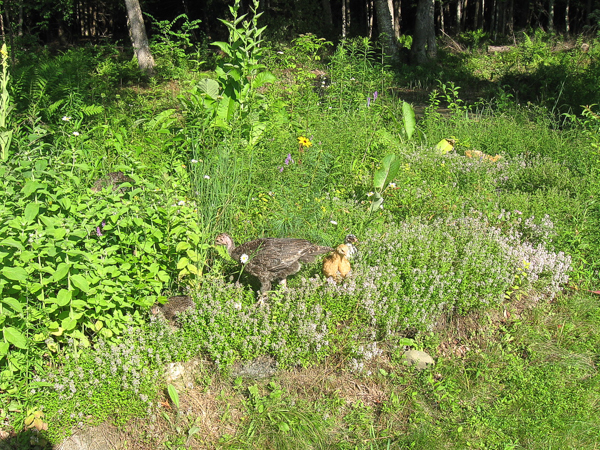
Overwintering Chickens without Heat
The trick to keeping chickens healthy in winter is to avoid moisture and drafts. Chickens can withstand surprisingly low temperatures, provided they’re kept in a dry, draft-free coop.
In the summer, chickens need good ventilation, but in the winter they need to be sealed in tight. Look for gaps between boards, and make sure there are no leaks in the roof. Any leaking water can be the end of them all.
In our first chicken coop at our old home, we built double walls and added insulation. Once we moved, there was already an old garden shed in the perfect spot, so we repurposed it as a coop.
Using deep bedding, the chickens are insulated from the cold ground even if there’s no insulation in the walls. The deep bedding method just keeps adding more shavings on top of the old, until the whole coop is cleaned out in the spring.
So long as the roof doesn’t leak and the walls are solid with no drafts, chickens can overwinter just fine, even in very cold areas. We’re a cold zone 4, and often temps don’t come above 0 for a week at a time mid-winter.
How to Keep Chicken Water from Freezing Without Electricity
The honest answer? You don’t.
At least, not in our cold climate. When it’s truly below 0 for a week at a time, the water is going to freeze. Chickens aren’t very active in this weather, and they mostly just hunker in their coop.
In the coldest weather, we provide them with a rubber feeder full of fresh fluffy snow all day. They can peck at that as they please, and then we bring them fresh liquid water every morning when we collect the eggs.
In weather that’s just a bit below freezing, a saltwater bottle inside a water dish works wonders. Take a soda bottle and fill it with saltwater. Float that in the chicken water dish and the salt will keep the water bottle from freezing.
It’ll break up the ice on the top of the chicken water as it bobs around, and as they peck at it for entertainment. This only goes so far, and in truly cold weather the bottle will just freeze right into the waterer.
In cold weather, switch to a water bowl. While a self-feeding chicken water jug is handy all summer, it’ll just break as it freezes in the winter.
Final Thoughts
Electricity is a fairly new invention in the grand scheme of things, but chickens have been domesticated for thousands of years. Resilient breeds lived without brooders, incubators and insulated coops just fine, and the people tending them staked their life on their livestock’s survival.
You can bet those chickens weren’t getting fancy chicken feed formulations, and they likely weren’t being fed grain at all. With the work that goes into growing and harvesting grain, do you think chickens got fresh grain rather than table scraps? That’s a topic for another article though…
Let me know your thoughts. Have you raised chickens without electricity?
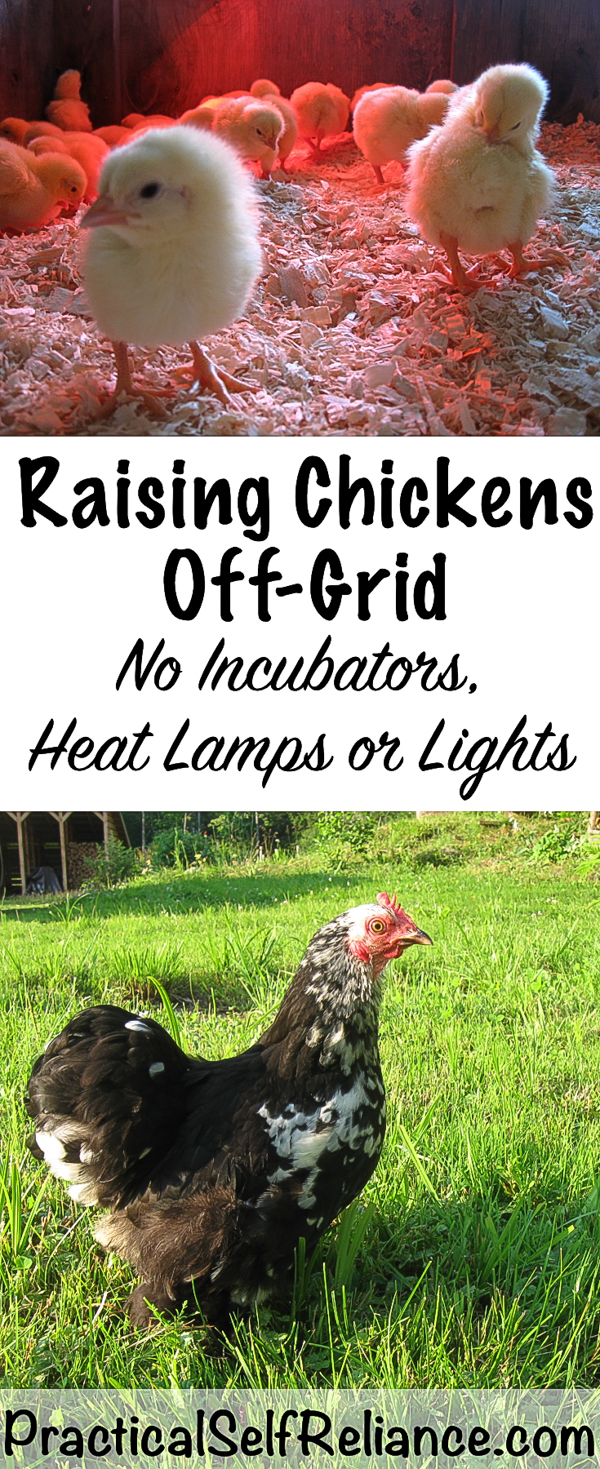
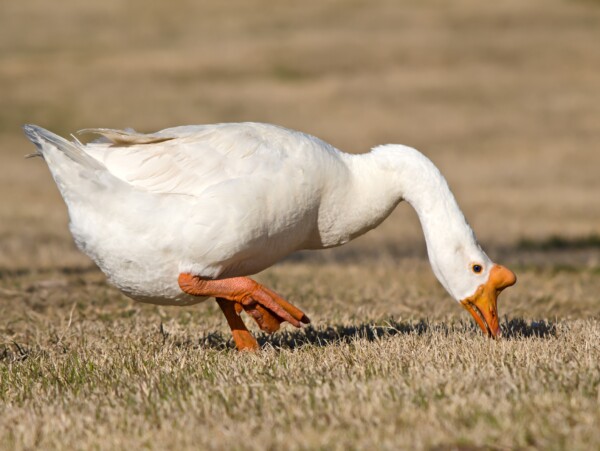
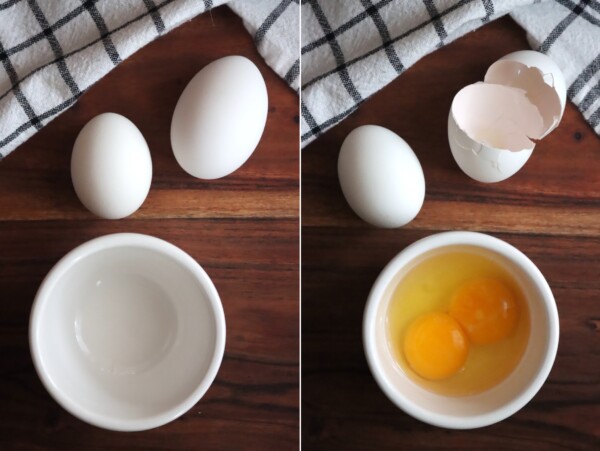
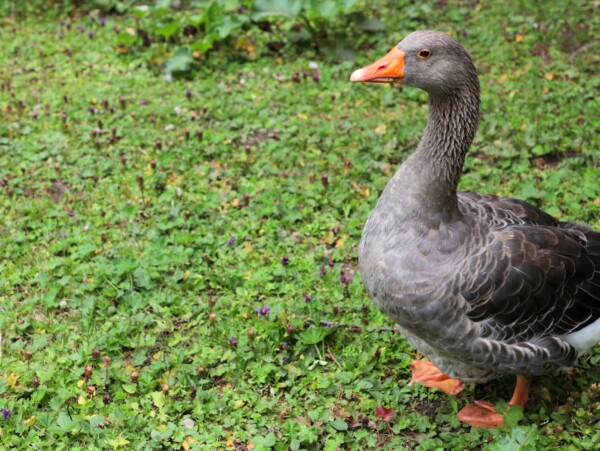
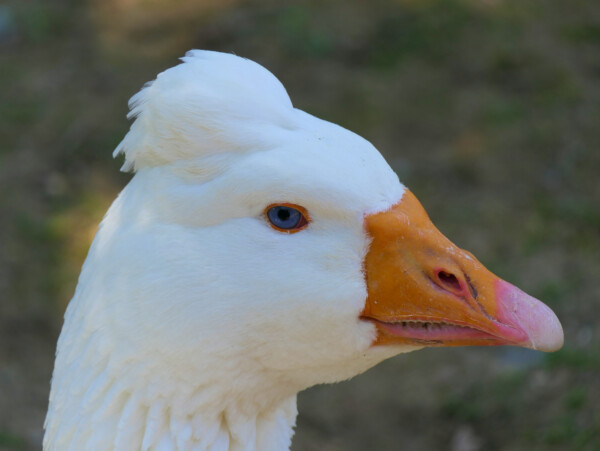
Where we are, it can get to -40 degrees in the winter! We have to use heat lamps. We have good insulation and keep drafts out. However, even then it’s been difficult to keep them warm enough. Part of the problem is the coop is too big for the small amount of chickens we have (we used to have more and that helped keep the coop warmer). Last winter I brought them warm soup/stew made from food scraps when it was extra cold.
Wow thanks for this post. I am currently building a raised chicken coop out of pallets & am going to be placing an order for keets & chicks within the next week or so. I have a 110 gal black poly stock tank to use as a brooder. We live off grid & I have been looking at tons of posts to try to have success from the start. Planning on Barred Rock & guineas, they will be free ranging a very nice garden area with swales & deep mulch. Excited to see how they work at attacking the ticks & chiggers 😁.
You’re very welcome. We’re so glad you enjoyed the post. How exciting to be adding some poultry to your homestead.
I once used a hot water bottle in the brooder pen with the babies. I don’t remember how long I had it in there, or why I didn’t have a lamp, but a nice big bottle with hot water and a towel wrapped around it worked well from what I remember.
That technique works well too!
I just found your page here and I am excited! I initially found you because we have loads of apples this year and I wanted to do pie filling and apple butter for the first time.
I live very close to the VT border in NY and although my winters aren’t as cold as yours consistently, we do get below 0 temps often.
couple of questions. I have had chickens here for over 10 years, butI was always told to have a light in their pen so they continue to lay eggs. I never use a heat lamp as I have broody hens and a smaller group than you seem to have (40). Do they all still lay eggs during the dark winter months without light?
I have built a coop inside at the far end of our barn and cut a hole to lead outside into a large pen area. The barn ins’t insulated, but they are relatively warm. No cold deaths yet! I have my water plugged in, but I think the salt bottle – which I had never heard of- may work for us. what do you use for the water? a bucket? low and wide or just a smaller one you fill each day? I am excited not to have to plug in a heat source for our water. This may work for my sheep bucket as well! Thank you!
We don’t have any electricity in our coop. I haul out a bucket of water to them everyday in the very cold months, and they go out and peck at snow (seemingly for fun?). I have a rubber tray that the water goes into, like a rubber bucket but only about 6 inches deep. When it freezes, I dump out the ice block and refill. No light either, and thus far they’ve actually produced pretty well in the winter, but I think that’s more about the breed of chicken. (Currently raising barred rock chickens)
ok thanks. I have a few different breeds, one being barred rock. I appreciate your info
How and when can you tell if it is a hen or cock? I also live in a pretty versatile climate Washington State temps never get to zero in winter maybe 20f so do I need a heat lamp and do I keep it on 24/7
It is possible to tell the difference between a hen and a rooster at a very early age if you are very experienced. If you are not experienced, it can be very difficult. If I am purchasing chicks, I prefer to let the professionals handle it and just purchase pullets. If I have a broody hen who hatches them out herself, then I just wait and see. Once they start getting a little older, you will be able to tell by both appearance and behavior which ones are male and which are female. Adult chickens can withstand pretty cold temperatures without a heat lamp, but baby chicks are a different story. Chicks should be kept in temperatures of 95-100 degrees Fahrenheit for the first two weeks. After that you can gradually start decreasing the temperature 5 degrees every week. If your hen is hatching them out, then you won’t have to worry about this. She will keep them warm.
We live off grid,but we have no control over the generator as its shared with the farm we rent the house from,its only on twice a week so we have no form of heat from it and cant use anything but lights and low power items.We use broodys but sometimes the would abandon a chick if it hatches later than the rest. We once hatched an egg that had pipped but been left by holding it amd makimg sure we got our hands damp every hour or so ,so the membrane didnt dry out. The abandoned chicks we carried around in our jumper etc for two days until they regulated their body temperature better at night they went in a salad tub with a lid that had slats Then under the covers or in the front room but one chick died that way near me under the bedclothes has always been successful even in bitterly cold weather. After those early days they went in a plastic tub also with a slatted lod and we took turns picking them up every so often to make sure they werent cold.At night they slept with an old jumper and snuggled in it to keep warm.I bought broody breeds for hatching eggs ,a goldtop and a pair of silkies but my mixes Breed part pekin bantams were the best,we never had to hand rear any of their chicks
hi, the best mum is the actually species Mum. But we can do it!
You can actually get with domestic poultry, pretty decent Mums by having a good mother type cock mating with your laying hens, ex batteries! Incubate those eggs, Raise the babies, a hay box is good..
Hay box, You take a big box, make a circle ish in it,Stuff the outsides with DRY, DRY, matter add chicks., a hot water bottle or warmed bricks under neath! Cover with enough stuff for air flow.
Thank you for the post. I’m reading as we had 41 baby chicks and 1 hen die last night in a fire because of heat lamps. Our whole she shed burnt down. My mom says no more baby chicks, but my 4 year old grandson wants babies. I spoil him and am teaching him farming, so looking at ideas.
Maybe no chickens and start living off the land as a vegan.
Great for some, not for all.
I just got chicks from my hen. I keep them in a isolated coop with no heating. Only led lights for the chicks to see.. but they spend all day outside with their Mama. They’re 4 days old now.. the other chickens and rooster free range all day doing their businesses and I close the chicks inside the outdoor coop so they can get privacy from the others.. at evenings I let them all in side their coop and help the small chicks up the ladder, they stil can’t figure out how to walk up it yet lol. They seem to be healthy little fluffers pecking in the grass with they’re mom.. greetings from iceland
Interesting post, thank you for writing it. I’ve always used heat lamps for chicks in the past and this article has given me some new ideas to think about. I really like the salt water bottle idea as it would also help to relieve winter boredom a bit for the chickens, I’ve never heard of that before. It reminds me of the big balls in cattle waterers, ha ha. Thanks for sharing 🙂
We have found the salt water bottle to be a great source for our chickens water. We use this method most of the winter, great for those times when the weather is changing, between seasons.
If you got them early in the spring, if keeping them close to the wood stove where it’s warmer would work, if the air temp is high enough?
Possibly, but it would be very tricky to regulate the temperature, and they’d go back and forth between cooking and being cold, at least in our setup. In the mornings, it’s often 45 degrees in the house before we restart the wood stove in the winter. In the spring, things are unpredictable, and some years it might work, others not.
We tried raising ours in our bathroom.. *Never Again*! There were sixteen in all, and the amount of dust they created was truly unreal.
I wonder whether some kind of container filled with boiling water each night would help. A kind of giant hot-water bottle. It could have a raised platform under which they could huddle. I think I am going to work on something like this for the spring.